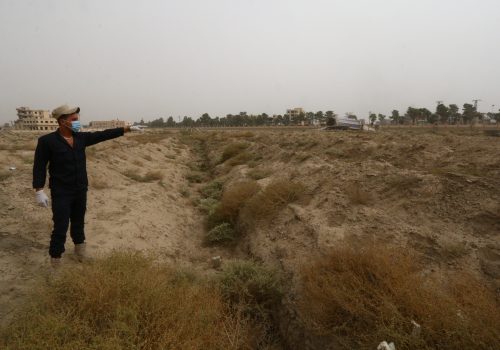Limited and constrained: The Biden administration and the prospects of a Syria policy
Like many in the world, Syrians anxiously awaited the results of the November US presidential election. Now that Joe Biden has won, many Syrians are pondering the prospects of what a Biden presidency may mean for their tormented country. While any departure from the Trump administration’s transactional and inconsistent leadership is welcomed, the hopes surrounding the incoming Biden administration’s return to engagement in Syria requires more in-depth scrutiny.
In Syria, the Biden administration will be bounded by a whole host of constraints that would ultimately impede meaningful impact—at least in the short-to-medium term. The United States has some sobering issues to attend to at home that present the president-elect with a demanding schedule and some serious limitations on foreign policy choices. Furthermore, there are systemic constraints on Biden’s foreign policy priorities that would not place Syria among those at the top of the list. Even if the Biden administration dedicates serious effort to reengage with the Syria file, the battle in Syria’s political and military landscape is one in which Washington has long been merely an observer. The most auspicious situational assessment of the Syrian conflict would offer little avenues for US leadership and inherently tie engagement scenarios to similarly contentious files, such as US relations with Turkey, policies on fighting terrorist groups, countering Iran, and the compounding rivalry with Russia.
The right people, the wrong time
During his campaign, then-Democratic presidential candidate Biden vowed to undertake necessary steps to renew America’s global leadership. In this light, the president-elect has been busy arranging his teams and devising what appears to be a comprehensive agenda for foreign policy. Biden’s nomination of Antony Blinken for secretary of state is particularly relevant to the prospects of a Syria policy.
The Blinken appointment not only indicates the intention to return to normalcy—liberal internationalism and an assertion of democratic values in foreign policy—but also awareness of previous missteps. Although Biden appears to have avoided commenting on Syria, Blinken, who was a second liner in the Obama administration, acknowledged “failure” over their Syria policy. He told Face the Nation in May: “the last administration has to acknowledge that we failed not for want of trying, but we failed. We failed to prevent a horrific loss of life. We failed to prevent massive displacement of people internally in Syria and, of course, externally as refugees.” Blinken pointed out that the US must support local partners in Syria’s northeast, maintain pressure on the Bashar al-Assad regime for concessions, and start reengaging the diplomatic track for resolution. However, this remains short of a clearly pronounced policy position and is unlikely to be matched with sufficient political capital and commitment, regardless.
Biden’s foreign policy vision is for the US to return as a strong global leader and a proactive superpower. But the domestic environment in the US is not conducive to bold foreign policy commitments this time around, particularly as it is fraught with challenges caused by the coronavirus pandemic and economic fallout. Public appetite for maintaining US global hegemony is diminishing. There are rising domestic forces—those in anti-war movements and progressives—who challenge the very concept of America’s global leadership and seek a full makeover of the US foreign policy outlook. And, while the White House does hold some autonomy regarding foreign policy, the Biden administration will nonetheless be checked by a divided Congress—by Republicans and Democrats—and a need to unify his party’s ranks.
For Syria, in particular, the conflict is increasingly being addressed in the context of the US’s “endless wars.” The argument goes that the US must leave Syria and other conflict zones to “end endless wars.” The truth is leaving or disengaging does not end wars or protracted conflicts. While this trope is gaining momentum from both sides of the aisle, there appears to be little effort put towards devising a strategy where the US plays a role in actually ending conflicts while protecting national security and geopolitical interests at the same time. This discourse, particularly as it pertains to military deployments, would likely add to the growing attitude which favors US disengagement.
As mentioned before, the incoming administration will have an overflowing agenda of foreign policy priorities, where not only Syria but the larger Middle East will not make it to the top, with the possible exception of Iran’s nuclear program. Biden will likely be busy restoring alliances and pivoting his central focus to East Asia to address the growing strategic competition with China.
Too little, too late
Aside from the domestic determinants, the Biden administration will inherit little leverage in Syria that would suffice meaningful impact. The key failure of the Barack Obama and Donald Trump administrations is that neither really acknowledged the strategic interest the US has in a stable Syria and, accordingly, treated the country’s conflict as a second-rank issue, subjecting involvement to interlinked geopolitical matters, such as fighting the Islamic State of Iraq and al-Sham (ISIS) and countering Iran.
Today, the US continues not to have a distinct Syria policy and the conflict presents no easy answers. When Biden settles into the Oval Office, Syria’s war will be entering its tenth year. Although ostensibly different, the Obama and Trump administrations employed a similar disengagement pattern in a conflict zone that is ever-evolving. For Biden, the challenges of today are different from those when he was last in office as vice president in 2016; power centers in Syria have shifted and, while the US military contingent in the northeast can play a positive role, the new administration will need time to secure ample leverage. As such, the Russians and the Iranians will control the trajectory of the conflict.
Biden will also be largely dependent on non-military tools in foreign policy, particularly diplomacy. Though important in the long run, the Biden administration’s intent to revitalize the Geneva political process for conflict resolution will be easier said than done. Over the past few years, Russia has established a parallel resolution process outside the UN framework. Reengaging diplomatically in Syria will require forging a collaborative relationship with the Russians and trusting their intent to end the conflict on favorable terms. There is no indication that Moscow may cooperatively push the political transition prospects towards a solution per UN Security Council Resolution 2254.
However, one bright prospect of US re-engagement in Syria is the Biden administration’s intent to restore aid provisions and increase support to civil society actors that would help stabilize disadvantaged geographical areas, like Idlib province and northeast Syria.
Other than that, the Biden administration will likely present a continuity of the status quo. Targeted sanctions will remain, but it is unclear how effective their employment would be without the use of other pressure tools. Biden will maintain US military presence in the northeast—if Trump does not suddenly withdraw them before leaving office on January 20—and will seek dialogue with Turkey regarding the Syrian Kurds.
Constrained and made timid by domestic, international, and conflict-specific factors, US efforts towards Syria under a Biden administration would not meaningfully address structural issues in the war-torn country. Yet, there is an indication that the Biden administration would be a more serious—and honest—actor in Syria. Washington owes it to Syrians to provide a pronounced policy position and allocate realistic measures to match objectives. If the past ten years have taught us anything, it is that saying something and not following through can cost dearly.
Abdulrahman al-Masri is an independent analyst, focusing on politics and security issues in the Middle East. Follow him on Twitter: @AbdulrhmanMasri.
Image: People wait at a checkpoint to enter the Yarmouk Palestinian refugee camp on the southern outskirts of Damascus, Syria December 1, 2020. Picture taken December 1, 2020. REUTERS/Omar Sanadiki


